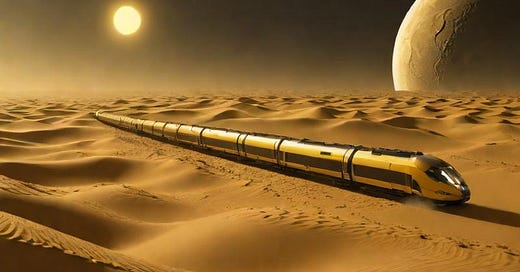What Logistics can learn from DUNE
The Critical Role of Logistics and the Power of Diversification
In only a few stories does logistics play a key role. For instance, what would Harry Potter be without the Hogwarts Express or what if Frodo in Lord of the Rings was late. However, in Dune logistics emerges as the linchpin of the story line, a fact that only becomes apparent at the end.
Interstellar Travel is a delicate topic in most sci-fi novels. However, the approach to it in Dune is uniquely distinctive, even by sci-fi standards. It is not the technology that stands out, but the way how deep-space travel is organized. In the Dune universe, there is only one logistics provider for interstellar travel, the Spacing Guild. They have a monopoly on long-range transports and exclusively hold the keys to navigating the cosmos. This places them as the most influential power in the universe, dictating terms and conditions that extend beyond mere pricing structures. Violating these terms leads to a lifetime ban from space travel, effectively stranding people wherever they are. This is considered the ultimate penalty.
A significant but often overlooked aspect of Dune is the central role of the Spacing Guild in the saga. Only the protagonist, Paul Atreides, recognizes this oversight and develops a strategy to use the Guild's dominance to ascend to the imperial throne.
While Dune may seem disconnected from real-world logistics, the parallels are striking. Just as in Dune, the critical nature of logistics is frequently underestimated in reality. This becomes particularly evident when minor disruptions like the Suez Canal blockade can halt entire production lines.
This brings us to the resilience of supply chains. If a single disturbance can cause a supply chain to collapse, it's not robust enough. In risk analysis, not all factors can be considered equally. Some scenarios, like captains being unable to sail due to a lack of 'Spice', are rather unlikely. Others, such as temporary blockades of the Suez or Panama Canal, dock workers' strikes, or farmers' blockades, are not only possible but somewhat likely. A resilient supply chain must be able to withstand such 'likely' events.
In Dune, a single element can halt all supply chains simultaneously. By threatening to destroy the Spice and thereby stop all interstellar transports, Paul Atreides gains ultimate leverage. While we see significant market power concentration in some segments, like ocean carriers, we are far from a single element halting all transport in reality. Still, such a scenario might not be as unlikely as we'd hope. The 2022 Shanghai lockdown, which led to global supply shortages and production shutdowns, is an example. Although this lockdown primarily affected Shanghai, it had worldwide economic impacts.
And here we are at another parallel to Dune: the inability to predict all risks. Imagine being the Imperial Chief Logistics Officer. Could you have foreseen that all Spice could be destroyed, halting interstellar transport? Probably not. However, supply chain diversification could have significantly mitigated the issue. And that's where the parallels to Dune end.
In reality, there are multiple logistics providers and transport routes, allowing for supply chain diversification. The Suez Canal blockade, for instance, didn't stop trade between Asia and Europe but did impede it. Resilient supply chains can withstand such disruptions without collapsing. However, this requires planning for time and capacity.
The key takeaway from Dune is this: diversification strengthens supply chain resilience, enabling them to weather crises and mitigate unforeseen disruptions.
Martin Bastian
Data Scientist
Want to get in touch with us ?
Send us a message: tp_freight_perspectives@trimble.com





